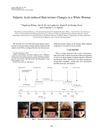 2 citations
,
January 2023 in “Journal of Clinical Medicine”
2 citations
,
January 2023 in “Journal of Clinical Medicine” People with hair loss conditions may also have thyroid disorders, but more research is needed to understand the connection.
104 citations
,
January 2023 in “Journal of Clinical Medicine” A holistic approach is needed to effectively address hair loss by understanding and influencing the hair growth cycle.
 2 citations
,
August 2022 in “Federal Practitioner”
2 citations
,
August 2022 in “Federal Practitioner” A severe medication reaction required long treatment and led to hair loss and thyroid issues.
 5 citations
,
November 2021 in “Skin appendage disorders”
5 citations
,
November 2021 in “Skin appendage disorders” Hair loss can cause stress and mental health issues, so treatments should address both the physical and psychological aspects, involving a team of dermatologists, psychologists, and hair specialists.
 2 citations
,
September 2021 in “Human Psychopharmacology: Clinical and Experimental”
2 citations
,
September 2021 in “Human Psychopharmacology: Clinical and Experimental” Valproate can cause hair problems, but there are ways to manage them.
9 citations
,
August 2021 in “Journal of clinical medicine” Pili torti is a rare condition where hair is twisted and breaks easily, often linked to genetic disorders or other health issues.
 12 citations
,
July 2021 in “Scientific Reports”
12 citations
,
July 2021 in “Scientific Reports” Glutamic acid helps increase hair growth in mice.
7 citations
,
May 2021 in “Seizure” Some antiseizure medications can cause cosmetic problems like hair loss, excessive hair growth, acne, and gum overgrowth.
 23 citations
,
January 2021 in “Journal of Dermatological Science”
23 citations
,
January 2021 in “Journal of Dermatological Science” The document concludes that we need more research to understand Telogen Effluvium and find effective treatments.
 25 citations
,
June 2020 in “Dermatology practical & conceptual”
25 citations
,
June 2020 in “Dermatology practical & conceptual” Scalp cooling can help prevent hair loss from chemotherapy, but treatment should be tailored to the individual and more research is needed.
 40 citations
,
May 2020 in “Cureus”
40 citations
,
May 2020 in “Cureus” The conclusion is that treatments for Telogen Effluvium exist, but standard treatment guidelines are needed.
 3 citations
,
January 2020 in “Annals of Dermatology”
3 citations
,
January 2020 in “Annals of Dermatology” More atypical club hairs may indicate Telogen Effluvium.
3 citations
,
November 2019 in “Clinical psychopharmacology and neuroscience/Clinical Psychopharmacology and Neuroscience” Valproate can cause both hair loss and curly hair in bipolar disorder patients.
 13 citations
,
April 2019 in “Seizure”
13 citations
,
April 2019 in “Seizure” Valproic acid increases the risk of hair loss more than other drugs, especially in migraine patients, and lamotrigine may be a safer alternative.
 134 citations
,
December 2018 in “Dermatology and Therapy”
134 citations
,
December 2018 in “Dermatology and Therapy” Some vitamins and minerals like vitamin D and iron can help with certain types of hair loss, but more research is needed for others.
 5 citations
,
August 2018 in “European Psychiatry”
5 citations
,
August 2018 in “European Psychiatry” Some psychiatric drugs can cause severe hair loss, especially valproic acid, and it's more likely in women or those with thyroid issues or past hair loss.
2 citations
,
July 2018 in “Journal of pediatric epilepsy” A teenager lost hair after starting epilepsy medication levetiracetam.
 17 citations
,
May 2018 in “Journal of Cosmetic Dermatology”
17 citations
,
May 2018 in “Journal of Cosmetic Dermatology” Most women in the study lost hair due to chronic shedding, with stress and nutrient deficiencies being common factors.
11 citations
,
January 2018 in “International journal of trichology” Valproate can cause hair loss and changes in hair appearance, but may help regrow hair when applied topically.
 5 citations
,
August 2017 in “The Journal of Clinical Psychiatry”
5 citations
,
August 2017 in “The Journal of Clinical Psychiatry” Biotin may effectively treat hair loss caused by valproate medication.
 1 citations
,
January 2017 in “Journal of Clinical and Diagnostic Research”
1 citations
,
January 2017 in “Journal of Clinical and Diagnostic Research” Sodium valproate can cause reversible hair loss in some patients.
 36 citations
,
December 2016 in “Journal of The American Academy of Dermatology”
36 citations
,
December 2016 in “Journal of The American Academy of Dermatology” The normal range for the hair pull test is 2 hairs or fewer, and washing or brushing hair before the test does not affect the results.
 18 citations
,
March 2016 in “Cosmetics”
18 citations
,
March 2016 in “Cosmetics” Telogen Effluvium is a condition causing excessive hair loss due to stress, illness, drugs, or hormonal changes, and can be treated with specific products or naturally resolves after 3-4 years.
9 citations
,
January 2015 in “Indian Journal of Pharmacology/The Indian journal of pharmacology” Higher doses of the medication valproate can cause hair loss, which may stop when the dose is lowered or the medication is stopped.
 70 citations
,
January 2015 in “Journal of Clinical and Diagnostic Research”
70 citations
,
January 2015 in “Journal of Clinical and Diagnostic Research” Hair loss from Telogen Effluvium usually gets better within 6 months after addressing the cause.
46 citations
,
December 2014 in “Epilepsy & behavior” Some antiepileptic drugs can cause weight gain and hair loss, especially in women.
 13 citations
,
November 2013 in “Seizure: European Journal of Epilepsy”
13 citations
,
November 2013 in “Seizure: European Journal of Epilepsy” Levetiracetam may cause hair loss, which can potentially reverse with lower doses or stopping the drug.
5 citations
,
August 2013 in “Epilepsy & Behavior”  61 citations
,
January 2013 in “Indian Journal of Dermatology, Venereology and Leprology”
61 citations
,
January 2013 in “Indian Journal of Dermatology, Venereology and Leprology” Hair usually grows back 1-3 months after treatment for anagen effluvium, and children with Loose Anagen Hair Syndrome often improve by adolescence.
 17 citations
,
January 2013 in “Indian Journal of Pharmacology”
17 citations
,
January 2013 in “Indian Journal of Pharmacology” High levels of the seizure medication sodium valproate can cause hair loss.
 67 citations
,
January 2013 in “Indian Journal of Dermatology, Venereology and Leprology”
67 citations
,
January 2013 in “Indian Journal of Dermatology, Venereology and Leprology” Chronic Telogen Effluvium may resolve after years and is diagnosed by examining the patient's history and clinical signs, with treatment aimed at underlying causes and possibly minoxidil.
 21 citations
,
June 2011 in “Journal of child neurology”
21 citations
,
June 2011 in “Journal of child neurology” Valproic acid and carbamazepine do not change biotin or biotinidase levels but may lower zinc levels, still within normal range.
48 citations
,
September 2010 in “PubMed” Chemotherapy often causes hair loss, which is distressing for many, but usually reversible.
13 citations
,
July 2010 in “Drug safety” Lamotrigine may cause hair loss, affecting treatment compliance and health.
16 citations
,
May 2009 in “Journal of child neurology” Valproic acid does not change biotinidase enzyme activity in children's blood.
4 citations
,
March 2009 in “Journal of pain and symptom management” Gabapentin may cause hair loss in patients treated for neuropathic pain.
 7 citations
,
January 2009 in “Immunological investigations”
7 citations
,
January 2009 in “Immunological investigations” A 3-year-old boy lost all his hair due to a rare reaction to phenobarbital, but it grew back after steroid treatment.
 91 citations
,
January 2009 in “International Journal of Trichology”
91 citations
,
January 2009 in “International Journal of Trichology” Different hair evaluation methods have their own pros and cons, and using multiple methods together is best for accurate hair loss diagnosis and tracking.
36 citations
,
October 2008 in “European journal of paediatric neurology” Valproic acid treatment may cause temporary hair loss due to reduced zinc and biotinidase levels, which tend to normalize after 6 months.
 10 citations
,
January 2008 in “Acta dermato-venereologica”
10 citations
,
January 2008 in “Acta dermato-venereologica” Carbamazepine caused hair loss and skin eruptions in a woman, which improved after stopping the medication.
 1 citations
,
September 2007 in “European journal of paediatric neurology”
1 citations
,
September 2007 in “European journal of paediatric neurology” Low dose valproic acid treatment caused hair loss in a young patient.
 13 citations
,
January 2007 in “Epilepsia”
13 citations
,
January 2007 in “Epilepsia” Valproic acid can cause reversible hair curling and persistent hair thinning.
 9 citations
,
August 2006 in “American Journal of Psychiatry”
9 citations
,
August 2006 in “American Journal of Psychiatry” A woman's hair loss stopped after she stopped taking lamotrigine, suggesting it might cause hair loss.
 207 citations
,
April 2006 in “Journal of The American Academy of Dermatology”
207 citations
,
April 2006 in “Journal of The American Academy of Dermatology” Iron deficiency may be related to hair loss, but there's not enough evidence to recommend iron screening or supplements for all hair loss patients.
 16 citations
,
October 2004 in “Acta dermato-venereologica”
16 citations
,
October 2004 in “Acta dermato-venereologica” Two people lost a lot of hair because of epilepsy drugs, but their hair grew back after changing medication.
 2 citations
,
June 2004 in “PubMed”
2 citations
,
June 2004 in “PubMed” Carbamazepine caused hair loss in a man, which stopped after he stopped taking the drug.
 29 citations
,
July 2003 in “PubMed”
29 citations
,
July 2003 in “PubMed” Hair loss affects both genders and can impact well-being, with treatments available for various types.
 144 citations
,
July 2002 in “Clinical and Experimental Dermatology”
144 citations
,
July 2002 in “Clinical and Experimental Dermatology” Telogen effluvium is a common type of hair loss that can resolve on its own or become chronic, with treatment depending on early diagnosis.
 2 citations
,
January 2002 in “Dermatology + psychosomatics”
2 citations
,
January 2002 in “Dermatology + psychosomatics” Topiramate may cause reversible hair loss.
73 citations
,
October 2001 in “Epilepsia” Children taking higher doses of valproic acid had lower biotinidase activity, which may lead to biotin deficiency, but biotin supplements could help.
 1 citations
,
September 2001 in “PubMed”
1 citations
,
September 2001 in “PubMed” Phenytoin, a medication, can cause hair loss and trigger a condition similar to lupus.
 63 citations
,
March 2000 in “Annals of clinical psychiatry”
63 citations
,
March 2000 in “Annals of clinical psychiatry” Some psychiatric medications can cause hair loss, but it usually grows back after adjusting the medication.
79 citations
,
January 2000 in “Annals of Clinical Psychiatry” Some psychiatric medications can cause hair loss, but stopping or reducing the dose usually reverses it.
6 citations
,
November 1999 in “Psychiatric services” A woman lost all her hair after overdosing on divalproex, but it grew back while still on the medication.
 1113 citations
,
August 1999 in “The New England Journal of Medicine”
1113 citations
,
August 1999 in “The New England Journal of Medicine” Hair follicle biology advancements may lead to better hair growth disorder treatments.
 4 citations
,
May 1999 in “PubMed”
4 citations
,
May 1999 in “PubMed” Some medications can cause reversible hair loss by affecting hair growth cycles.
 83 citations
,
May 1999 in “International Journal of Dermatology”
83 citations
,
May 1999 in “International Journal of Dermatology” Hair loss that spreads out can often fix itself or be treated by finding and handling the cause.
7 citations
,
October 1997 in “Journal of neurology, neurosurgery and psychiatry” Two patients with epilepsy experienced hair loss after taking the drug carbamazepine.
 38 citations
,
September 1996 in “Annals of Clinical Psychiatry”
38 citations
,
September 1996 in “Annals of Clinical Psychiatry” Hair loss from mood stabilizers is common but can be managed without stopping the medication.
20 citations
,
September 1995 in “PubMed” Many drugs can cause temporary hair loss, which usually stops when the drug is discontinued.
 63 citations
,
March 1995 in “International Journal of Dermatology”
63 citations
,
March 1995 in “International Journal of Dermatology” Some drugs can cause hair loss, and stopping these drugs often leads to hair regrowth.
 147 citations
,
April 1994 in “Drug Safety”
147 citations
,
April 1994 in “Drug Safety” Some drugs can cause hair loss or increase hair growth, but these effects are usually reversible when the drug is stopped.
 13 citations
,
May 1993 in “International Journal of Dermatology”
13 citations
,
May 1993 in “International Journal of Dermatology” The paper suggests that telogen effluvium, a type of hair loss, may be a long-lasting condition triggered by stress or illness in people whose hair growth is unusually synchronized.
22 citations
,
December 1992 in “The journal of pediatrics/The Journal of pediatrics” Zinc supplements improved hair and skin conditions in two patients.
 10 citations
,
March 1992 in “European Archives of Psychiatry and Clinical Neuroscience”
10 citations
,
March 1992 in “European Archives of Psychiatry and Clinical Neuroscience” Hair loss from mood stabilizers can grow back, but the reasons why are not fully understood.
 7 citations
,
September 1987 in “PubMed”
7 citations
,
September 1987 in “PubMed” Most hair loss cases are caused by four main conditions, and understanding them is key to treatment.
 12 citations
,
December 1985 in “Dicp-The annals of pharmacotherapy”
12 citations
,
December 1985 in “Dicp-The annals of pharmacotherapy” Carbamazepine can cause hair loss, which may reverse when the medication is stopped.
169 citations
,
August 1981 in “BMJ” Sodium valproate improved epilepsy control but often caused weight gain in children.
59 citations
,
October 1976 in “Acta Neurologica Scandinavica” Sodium valproate reduced seizures in many patients with resistant epilepsy.
170 citations
,
June 1974 in “BMJ” Sodium valproate effectively reduces seizures in epilepsy, especially in absences and myoclonic types, with minimal side effects.

















































